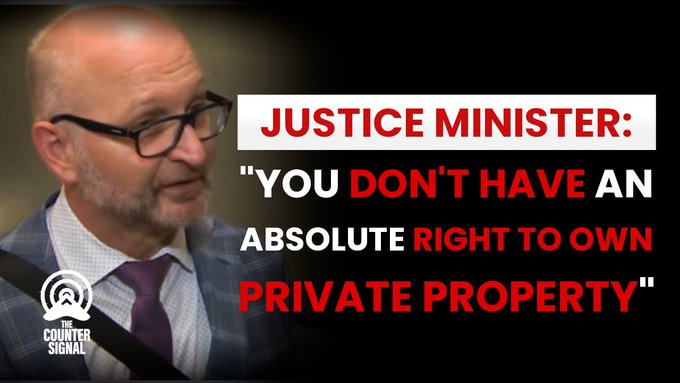by Keean Bexte
June 9, 2022
While responding to questions regarding the seemingly unlawful seizure of property owned by Russians, Liberal Justice Minister David Lametti said that people don’t have an “absolute right to own private property” in Canada.
“I’d just like to ask you about Bill C-19 — any idea of seizing and selling off Russian assets. There are some who say that’s on shaky ground. How do you respond,” a reporter asked the Justice Minister.
“Well, look. We’ll obviously tailor the provisions so that it can withstand a court challenge. You don’t have an absolute right to own private property in Canada,” Lametti said.
“There are steps that are taken when expropriations happen at whatever level of government, and we’ll be sure to stay within those boundaries.”
Read More HERE



Right of Private Property = Democracy
No Right of Private Property = Communism
Discussion of removal of a Canadian’s Right to Private Property = Sedition.
Full Stop. Cannot be argued otherwise. Plain and simple.
With respect to the communistic musings of David Lametti regarding “property rights”.
Here’s some interesting facts. As with most Liberals, he has his head up his ass. In one way he is right, there are no special “property rights” in the Charter of Rights and Freedoms. However, there are “common law rights”.
Charter Rights
Although the Canadian Charter of Rights and Freedoms does not expressly protect property rights, such rights are created and are therefore protected by both common law and by statute law — although both can be changed by legislation. Any constitutional guarantee should recognize that property is a social institution that must be constantly remolded.
A great jurist has warned that an absolute right of property would result in the dissolution of society. The importance of this warning can be best illustrated by considering a person who buys a gun. The property rights this person acquires in the gun cannot extend to permission to use the gun in any way. Similarly, landowners should not be permitted to pollute the air and water because this would lessen the enjoyment and property values of adjacent owners, and because of the moral obligation to pass on to succeeding generations a habitable planet. Property rights may therefore be modified to respond to new threats to the environment. There is no preordained harmony between private rights and public welfare; society will always face the dilemma of how to combine the efficient use of resources with effective regulation in the interests of all.
What Are Property Rights?
The popular notion of property as something owned, encourages the idea of property rights as absolute. However, property in the legal sense is more accurately regarded as the combination of the legal rights of individuals with respect to objects, and the obligations owed them by others and guaranteed and protected by government. Property is either classified as private property owned by one or more individuals, or public property owned by government.
Property law is also classified under common law as real or personal. Real property (or realty) is land, any buildings on that land, any mineral rights under the land, and anything that is attached to the land or buildings that can be considered permanent. Personal property (sometimes known as chattels) includes any property that is not real property. The difference between real and personal property comes from early English law, under which property was considered “real” if the courts could restore to the dispossessed owner the thing itself, rather than simply awarding damages as compensation for its loss.
Origin and Development
Property law, for all of Canada’s common law provinces, originated in England. The laws were established at various time — in Nova Scotia and (what later became) New Brunswick in 1758, Prince Edward Island in 1763, Upper Canada (Ontario) in 1792, Newfoundland in 1832, British Columbia in 1858 and the North-West (later the three Prairie provinces) in 1870.
The Constitution Act, 1867, gave legislative power over property and civil rights to the provinces. Thus general property law, including succession law and matrimonial property law (see Family Law), may only be enacted by the provincial legislatures. However, certain kinds of property (such as bills of exchange and promissory notes, patents, copyrights and interest for the use of money) are within federal jurisdiction. Parliament may incidentally affect property rights through legislation regulating interprovincial or international trade and commerce, through its power of taxation and through its power of expropriation. Nevertheless, general property law is the preserve of the provincial legislatures.
First it was the Russians, then it was the unjabbed, then it was those with ‘unacceptable views’, then they came for you while you stood by and let them remove everyone around you because it didn’t concern you.
This is another example of them grooming the population for something upcoming…